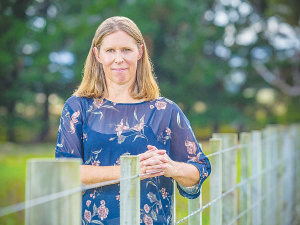Fonterra capital return could boost GDP – ANZ Report
The Fonterra divestment capital return should provide “a tailwind to GDP growth” next year, according to a new ANZ NZ report, but it’s not “manna from heaven” for the economy.
 Susan Kilsby says while farm gate milk prices are still reasonable, profit margins are being squeezed pretty quickly.
Susan Kilsby says while farm gate milk prices are still reasonable, profit margins are being squeezed pretty quickly.
Rising costs such as fertiliser, fuel and labour and an overall tightening of profitability is forcing dairy farmers to take a ‘more considered approach’ to their businesses.
ANZ bank agricultural economist Susan Kilsby says these factors are impacting more on intensive dairy operations rather than sheep and beef farms.
She says for some farmers’ interest rates have gone up pretty dramatically depending on their overall financial position. However, Kilsby adds that in the past few years when times have been good, farmers have paid down debt and these individuals are probably in a better position than otherwise would be the case.
“Farm gate milk prices are still reasonable but that margin is being squeezed pretty quickly in some cases,” she told Rural News.
Kilsby is noticing that farmers are looking closely at their farm businesses and making tweaks to improve their profitability. She says a lot are pretty exhausted because of the extra work they have had to do during Covid because of labour shortages.
She adds that others are making some changes to their systems by doing such things as milking once a day or three times every two days.
“Definitely some change but nothing dramatic. Some are trying to become a little bit more self-sufficient and therefore not grazing stock out as much as they used to,” Kilsby says. “A few more farms in the Canterbury region are looking at a little more cropping on farm or leasing out paddocks to commercial growers.”
She believes part of this change is in response to labour shortages but also in response to reducing nutrient emission levels.
Meanwhile, DairyNZ chairman Jim van der Poel says uncertainty in the dairy industry is causing farmers to think twice before investing. He says while the banks are offering money to invest in the sector, farmers are taking quite a cautious approach.
He says this is because of a number of things such as the shortage of labour, government legislation and the milk price coming down.
“As a result, there is a real reluctance among farmers to borrow that extra money,” he told Rural News.
Van der Poel says that is a reflection of things at the moment with confidence quite low and people are worried about what the future may hold. He says costs have gone up, the last two GDT’s haven’t been positive and there is still a labour shortage. He says in the last three years farmers have had to work harder than they would have liked.
“It would appear that they are taking stock, sitting back for a while and seeing how things play out, including what actions the Chris Hipkins’ government might take in the coming months,” he says.
Changed logos on shirts otherwise it will be business as usual when Fonterra’s consumer and related businesses are expected to change hands next month.
Reflecting on the past year, Horticulture New Zealand chief executive Kate Scott says there has been a lot to celebrate.
Ministry for Primary Industries (MPI) Director General Ray Smith is giving a big shout-out to the horticulture sector, especially kiwifruit.
Early forecasts for New Zealand's apples and pears point to a standout season marked by exceptional fruit quality and high pack-out rates.
Tickets are now available for Beef + Lamb New Zealand’s (B+LNZ) Out the Gate, returning from 19-21 May 2026 at Te Pae, Christchurch.
Dairy Women's Network (DWN) is welcoming AgriHealth as a new partner.

OPINION: Here w go: the election date is set for November 7 and the politicians are out of the gate…
OPINION: ECan data was released a few days ago showing Canterbury farmers have made “giant strides on environmental performance”.